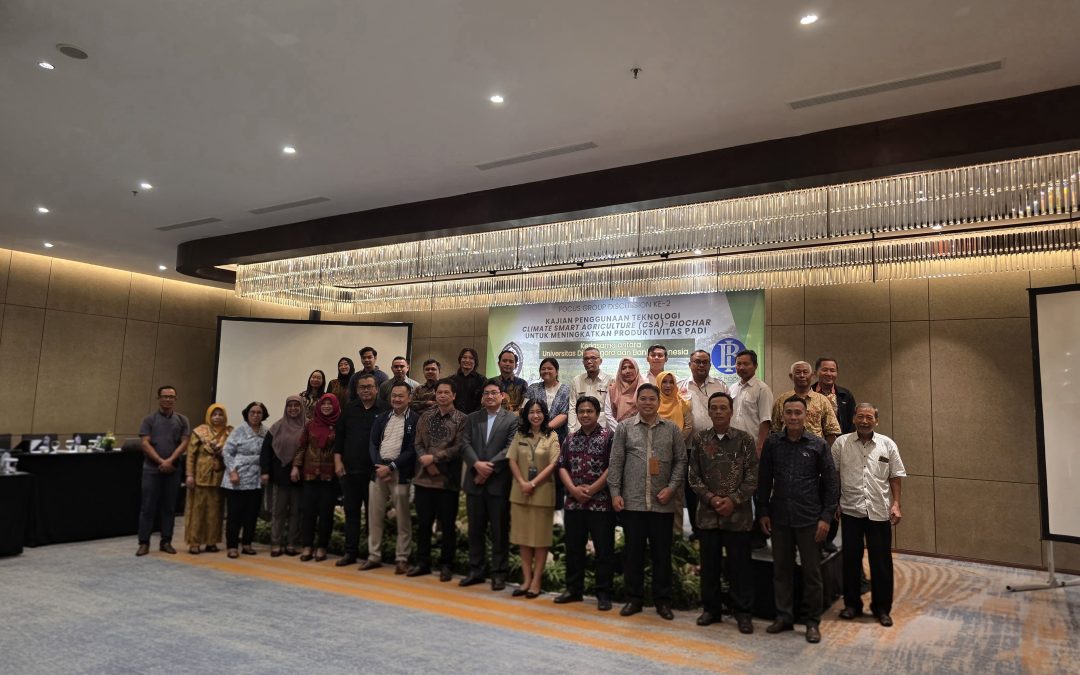SEMARANG, 3 November 2025 – Bank Indonesia (BI), in collaboration with the Institute for Research and Community Service (LPPM) of Diponegoro University (Undip), has successfully completed a series of joint research activities confirming the multiple benefits of biochar technology in enhancing agricultural productivity while contributing to climate change mitigation. The second Focus Group Discussion (FGD), titled “Study on the Use of Climate Smart Agriculture (CSA) Technology – Biochar to Enhance Rice Productivity”, held on Monday (3 November) at Aruss Hotel Semarang, marked the culmination of this collaborative research. The event brought together representatives from Bank Indonesia, the Ministry of Agriculture, the Coordinating Ministry for Food Affairs, the National Research and Innovation Agency (BRIN), the Grobogan District Agriculture Office, PT WasteX, and farmer groups from six subdistricts in Grobogan.
The research was carried out by a team from Diponegoro University led by Prof. Florentina Kusmiyati, with team members Albertus Fajar Irawan, Ph.D., Anasrullah, S.P., M.S., Fatikhah Nurul Fajri, S.P., M.P., Muhammad Iqbal Fauzan, S.P., M.Si., Nani Kitti Sihaloho, M.P., and Septrial Arafat, S.P., M.P. The findings demonstrate that biochar, also known as biological charcoal, provides dual benefits for both agriculture and the environment. In agricultural terms, the application of biochar was proven to significantly increase the yield of dry harvested rice. This improvement is supported by positive changes in plant growth components such as the number of tillers and the percentage of filled grains. From an environmental perspective, biochar acts as an effective soil conditioner that improves soil quality by stabilizing soil pH and increasing the availability of essential nutrients like phosphorus. The research also revealed a remarkable environmental impact, with biochar shown to substantially reduce greenhouse gas emissions—particularly methane—from paddy fields.
Despite these encouraging findings, the discussion highlighted several challenges related to implementation at the farmer level. Representatives of farmer group associations (Gapoktan) from Klambu, Godong, Gubug, Karangrayung, Grobogan, and Penawangan raised concerns about the price and accessibility of biochar. They noted that the current commercial price of around IDR 3,400 per kilogram remains too high for many small-scale farmers. In addition, there is still a lack of understanding among farmers, many of whom have received misinformation regarding biochar. They emphasized the need for widespread education and outreach programs to clarify the true functions and mechanisms of biochar.
Responding to these issues, Prof. Neneng, a biochar expert from BRIN, provided clarification by emphasizing that biochar is not a fertilizer and does not produce instant results, but rather serves as a soil conditioner that works over time. She explained that applying five tons per hectare at the beginning can improve soil quality for up to four planting seasons. This clarification encouraged further collaboration among stakeholders. Nabila from PT WasteX, a biochar producer, expressed the company’s readiness to explore a 50% price reduction—lowering the price to IDR 1,700 per kilogram—for first-time purchases. In response, Wakid Mutowal from the Grobogan District Agriculture Office affirmed the office’s commitment to mobilize agricultural extension workers (PPL) to educate farmers and coordinate with PT WasteX. Similarly, Sri Mulyani, Coordinator of Agricultural Extension at the Ministry of Agriculture, underscored the importance of cooperation among all parties to ensure that farmers do not remain dependent on the instant results provided by synthetic fertilizers.
Heru Rahadyan, Deputy Director of Bank Indonesia, highlighted that the research outcomes could help reduce the dependence on subsidized fertilizers. He also introduced BI’s green innovation, BI-Green, an initiative that converts unfit currency notes (UTLE) into biochar with added economic and environmental value. Looking toward long-term implementation, Kus Prisetiahadi, Assistant Deputy at the Coordinating Ministry for Food Affairs, proposed two strategic schemes to make biochar more affordable. The first is a raw material exchange model in which farmers can supply rice husks as feedstock for biochar production. The second involves a subsidy scheme through carbon offsetting, where biochar producers could sell carbon credits to industries and use the proceeds to subsidize biochar prices for farmers.
The FGD concluded with a shared commitment to expand demonstration plots, intensify education efforts through agricultural extension workers, and develop new business models to ensure that the benefits of biochar can be sustainably enjoyed by farmers across Indonesia.


Recent Comments